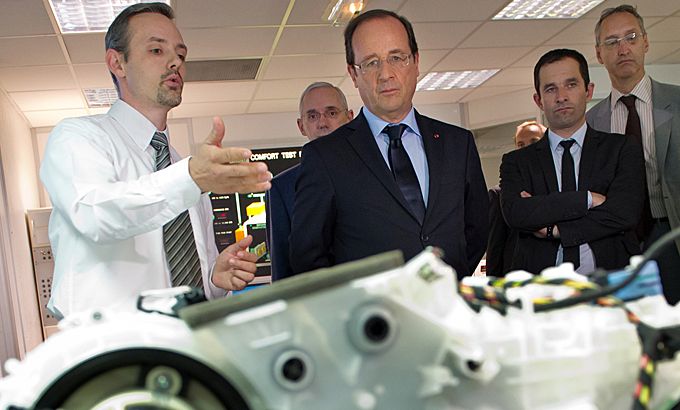French budget raises taxes on rich
Finance minister says taxing corporations is crucial as new government unveils fiscal plan aimed at cutting deficit.

The French government has presented its 2013 budget, which includes tax increases on the wealthy and on businesses in an effort to meet deficit-reduction targets.
Friday’s announcement of France’s toughest single belt-tightening in 30 years was the first budget presentation for Hollande since his election in May.
Keep reading
list of 4 itemsBoeing hit with 32 whistleblower claims, as dead worker’s case reviewed
US imposes new sanctions on Iran after attack on Israel
A flash flood and a quiet sale highlight India’s Sikkim’s hydro problems
The package will recoup 30bn euros in savings with a goal to reduce the deficit to three per cent of Gross Domestic Product (GDP) in 2013, from a forecast of 4.5 per cent this year.
President Francois Hollande’s cabinet defended the spending plan for next year, calling it a “fighting budget” that would win the “battle” against joblessness and help growth.
“If we abandon this goal, right away the rates will rise and then we will be in the same situation as Italy, in the same situation as Spain, and I do not want that,” Jean-Marc Ayrault, the prime minister, said vowing the deficit will be met.
| France’s 2013 savings |
|
TOTAL: 36bn euros Al Jazeera speaks to former Le Monde editor |
To reach the goal, officials have said the budget will target 10bn euros in extra taxes on high-income households, 10bn from taxes on businesses and 10bn in spending cuts.
“The debt, which keeps going up and going up, has to end. [It] has gone up by 30 per cent in five years. This is unsustainable.Paying back [the] interest is the biggest cost we have. We want to put an end to this”, Ayrault said on Friday.
The French prime minister also stood by the government’s growth forecast of 0.8 per cent for 2013, saying it was “realistic” and “attainable” despite concerns from some economists that the forecast is too optimistic.
The budget is expected to introduce a fiscal reform taxing capital gains, interest and dividends as regular income, as well as a populist move to impose a 75 per cent tax rate on incomes above one million euros.
Ayrault said the increases would affect only the top 10 per cent of French taxpayers, a “small minority” of two to three thousand taxpayers.
“In constant incomes, nine out of 10 French taxpayers will not be affected by the tax increases,” he said. “These new measures spare the middle and working classes.”
After defeating incumbent Nicolas Sarkozy on a growth and jobs platform, Hollande has been keen to avoid any appearance that his government is pushing austerity.
But with unemployment steadily on the rise – joblessness topped three million for the first time in more than a decade in August – Hollande is under increasing pressure to deliver on his vision as his popularity wanes.
Hollande had promised to deliver 150,000 new jobs, Al Jazeera’s Nadim Baba reported from Paris.
Though Hollande had promised to tackle France’s economic problems, his government “can’t really do much about some things, like the lack of growth this year” or recent factory closures, both problems the Hollande administration said they “inherited” from the previous government, our correspondent said.
The second quarter of 2012 marked the third consecutive quarter of stagnation for France, the second biggest eurozone economy.
 10bn government spending cuts
10bn government spending cuts